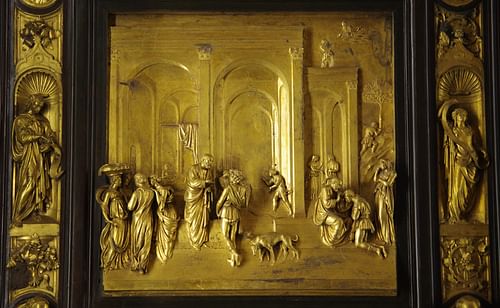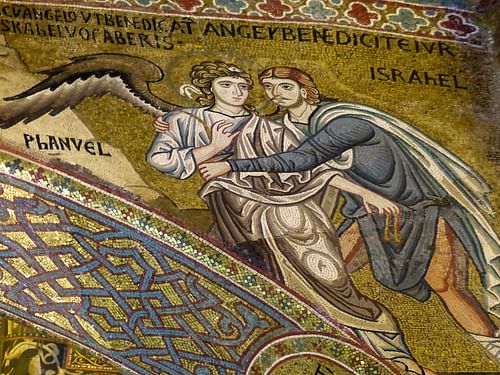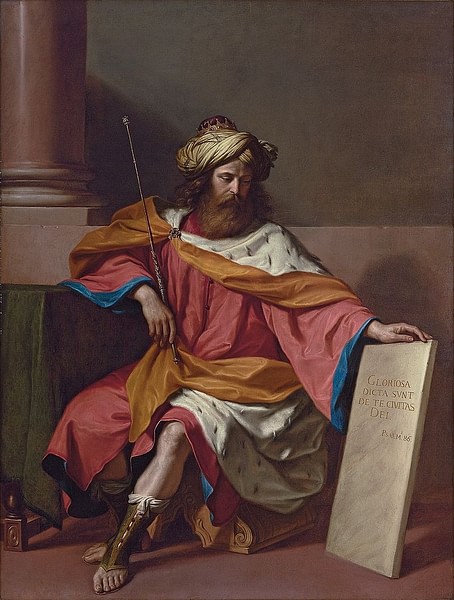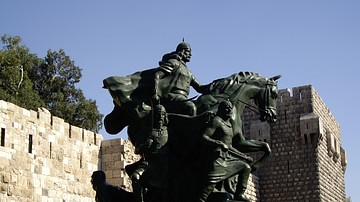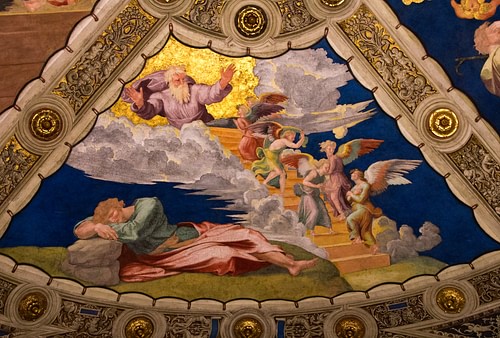
Jacob is one of the patriarchs of ancient Judaism and the father of who became the twelve tribes of Israel. His story is told in Genesis 25-50. His Hebrew name is derived from Ya-aqob ("to supplant" or "circumvent") and is constructed from the details of his life. In Greek, it is "Iakobos", Latinized to "Jacob." In the biblical account, we are told that the name comes from the ‘aqev ("heel"). His name was later changed to "Israel."
The Birth of Jacob & Esau
After the birth of Isaac, Abraham sent a servant to Haran (modern Iraq) for a bride from his relatives there. The servant returned with Rebecca. While pregnant, Rebecca suffered pains in her womb. God told her:
Two nations are in your womb, and two peoples from within you will be separated; one people will be stronger than the other, and the older will serve the younger. (Genesis 25:23)
Esau was born first and emerged covered with red hair. Grasping his heel was Jacob as if attempting to be born first. In context, many ancient cultures practiced primogeniture, meaning that the right of succession went to the firstborn son. In addition, their parents had a different attitude toward both:
The boys grew up, and Esau became a skillful hunter, a man of the open country, while Jacob was content to stay at home among the tents. Isaac, who had a taste for wild game, loved Esau, but Rebekah loved Jacob.
The Loss of the Birthright
One day Esau returned from a hunt but was unsuccessful. He begged Jacob to give him the stew that Jacob had cooked. Jacob offered it in return for Esau's birthright, to which Esau agreed. Now old and blind, Isaac asked Esau to hunt for some venison, for his last meal and then he would bless Esau. While he was away, Rebecca connived with Jacob to disguise himself (wrapping some clothes of Esau's and some goatskins on his arms). He should pretend to be Esau so he could receive the deathbed blessing. Deathbed blessings were carved in stone. Isaac asked to feel his arms because he was confused: "The voice is the voice of Jacob, but the hands are the hands of Esau" (Genesis 27:22). Smelling Esau's clothes, Isaac gave Jacob the blessing.
Coming home, Esau was outraged at the deception. Isaac could not change it but told Esau: "You will live by the sword and you will serve your brother" (Genesis 27:40). Rebecca encouraged Jacob to flee to her brother Laban's house in Haran.
This detailed narrative is understood by scholars (at least) as one of the ways in which to understand later traditions concerning the distinctions and rivalries between the kingdom of Edom and the other Jewish tribes. Edom was located south of the Dead Sea and incorporated many indigenous tribes. After the Greek occupation, it was designated Idumea. After the Maccabean Revolt (167 BCE), the Hasmonean leader John Hyrcanus (164-104 BCE) forcibly converted the region.
Jacob's Ladder
On his way to Haran, while Jacob slept, he had a vision of a ladder or staircase, which reached towards heaven, with angels going up and down. Later traditions explained this as representing the exiles, those who lived outside the land of Israel. The highest of these may have been understood as Edom. Jacob feared domination by Edom, but God told him that in the final days Edom too would succumb to Jacob. The site of this vision was named Bethel, "God's house."
Jacob, Rachel, & Leah
When Jacob arrived in Haran, he went to the well where he saw Rachel and was immediately smitten. Asking her father Laban for her hand, Laban agreed on the condition that Jacob work for him for seven years. Jacob agreed, but on the wedding night, when he lifted the veil, it was the older sister, Leah. The elder daughter had to be married first. Laban then offered Rachel as well, Jacob had to work an additional seven years.
We now have a replication of both the typology of barren women and divine intervention that we have in the story of Abraham and Sarah. They were promised descendants, but they were old and childless (Jacob was 84 when he began producing children.) The Bible has many stories of barren women, but all of them eventually become mothers through divine intervention. We also see an ancient version of surrogate motherhood; Sarah offered her slave, Hagar, to take her place. Legally, the child of Hagar was the son of Abraham and Sarah.
Because Leah was unloved, God " enabled her to conceive, but Rachel remained childless" (Genesis 29:31). Rachel was barren, so she offered her servant, Bilhah to Jacob. Leah then became barren for a time and offered her servant Zilpah. Rachel then produced two sons of her own.
The sons of Jacob became the twelve tribes of Israel. They are:
| Leah | Rachel | Bilhah | Zilpah |
|---|---|---|---|
| Reuben | Joseph | Dan | Gad |
| Simeon | Benjamin | Naphtali | Asher |
| Levi | |||
| Judah | |||
| Issachar | |||
| Zebulun |
The only named daughter is Dinah (by Leah). The specific details were most likely added later, to explain how and why each son received their territories when the tribes conquered and settled in Canaan. The relegation of the lands, from good to less fertile, was determined by the son's mother; Rachel or Leah, Bilhah or Zilpah. Because they were Rachel's sons, Jacob favored Joseph and Benjamin. This later resulted in family tensions that led the brothers to sell Joseph to a slave caravan going to Egypt.
From Jacob to Israel
Jacob was determined to go home. One night near the Jabbok ford, a being appeared (a man in some texts, God or an angel in others). Jacob wrestled with this being until dawn. Jacob could not be overpowered, but the "socket of Jacob's hip was touched near the tendon" (Genesis 32:32), which resulted in Jacob having a limp. This became the mitzvah of porging or the removal of the fatty veins and sinews of a carcass in the preparation of meat.
Jacob demanded a blessing. From this moment, Jacob would be called Israel, because he has "struggled with God and with humans and ... overcome" (Genesis 32:28). Jacob is thus the eponymous ancestor of the Israelites. Jacob named the place Peniel ("face to face"), because "I saw God face to face, and yet my life was spared" (Genesis 32:30). Jacob met Esau at the border and the two brothers were reconciled.
In Egypt
Genesis then relates the story of the brothers selling Joseph as a slave to the Egyptians, but correctly interpreting a dream of Pharaoh, he was elevated to Egyptian vizier. Jacob sent his sons to Egypt to negotiate for grain as there was a famine in Canaan. Initially, the brothers did not recognize Joseph, but he eventually revealed himself and told them to bring Jacob and the clan to Egypt. This is the background story for how and why the tribes migrated to Egypt and were later enslaved in the book of Exodus.
The last we hear of Jacob is in the penultimate chapter of Genesis (49:1-33), where he presented his deathbed blessing upon his sons. Beginning with eldest, Jacob went through the list, predicting their eventual fate in the land of Canaan and beyond. The eldest, Reuben, was diminished because he had intercourse with Bilhah, "went up onto [his] father's bed ... and defiled it" (Genesis 49:4). Judah, although fourth in line, became elevated:
Judah, your brothers will praise you . . . your father's sons will bow down to you. . .The scepter will not depart from Judah nor the ruler's staff from between his feet. (Genesis 49:8-10).
The elevation of Judah was important because his descendant, King David, became the greatest king of ancient Israel.
The Tomb at Machpelah
Abraham bought a piece of land from Ephron the Hittite near a cave at Machpelah (modern Hebron) as the family tomb. Jacob asked Joseph to make sure that his bones were delivered there. Known as the Tomb of the Patriarchs, the building was restored by Herod the Great and remains a pilgrimage center. Buried within are Abraham and Sarah, Jacob and Leah, and (by tradition) Joseph. Rachel had died in childbirth with Benjamin at the side of the road near Bethlehem. Her tomb there is also a pilgrimage site for barren women.
Christianity honors Jacob as a saint, like the rest of the patriarchs. Islam promotes him as a prophet of God who was also concerned with purity and devotion. In the version in the Quran, we are told that Jacob made his sons promise on oath that they would remain Muslims in submission to God.
Historicity
Utilizing clues in the narrative of Genesis, scholars date the stories c. 1800 BCE as demonstrating nomadic ways of life in the region. However, recognizing that these stories were constantly edited over time, skepticism remains. As Israel experienced wars and disasters, the stories were updated to reflect contemporary events. We have yet to determine historicity in this period in the archaeological record. This does not invalidate the stories but recognizes that context is important in the evaluation of the narratives.

